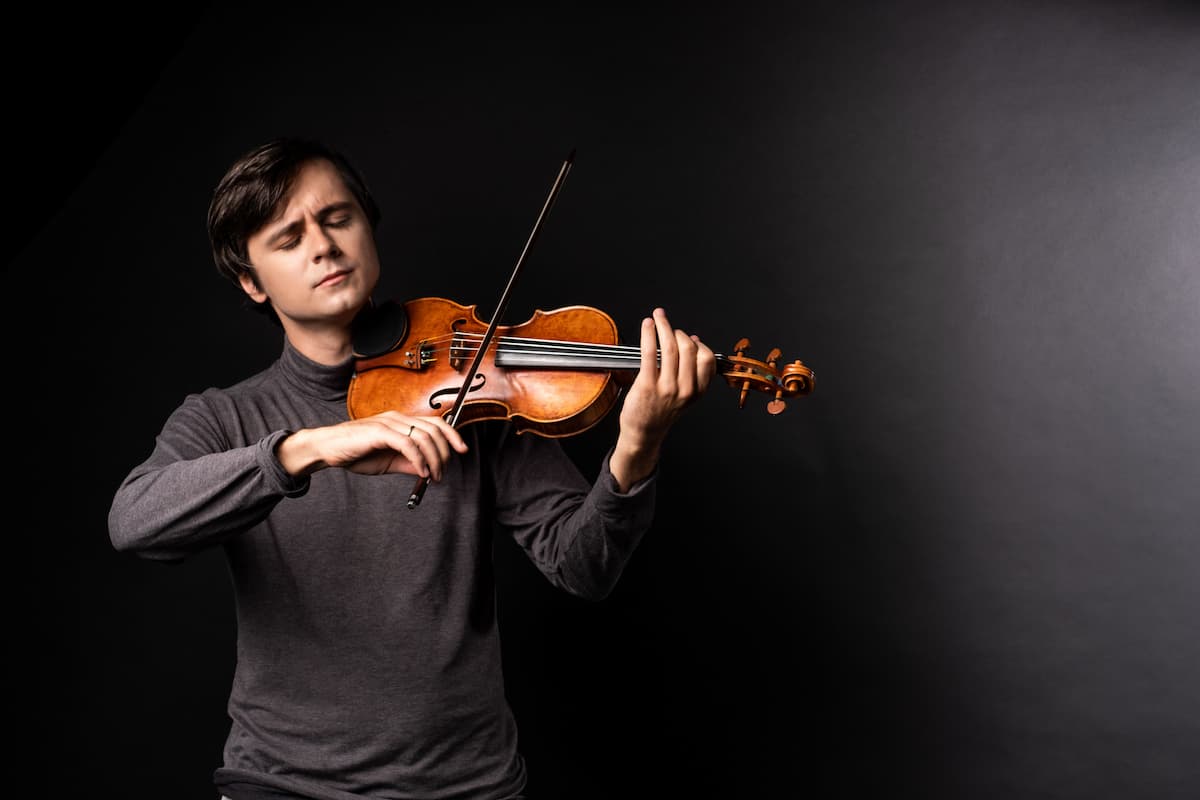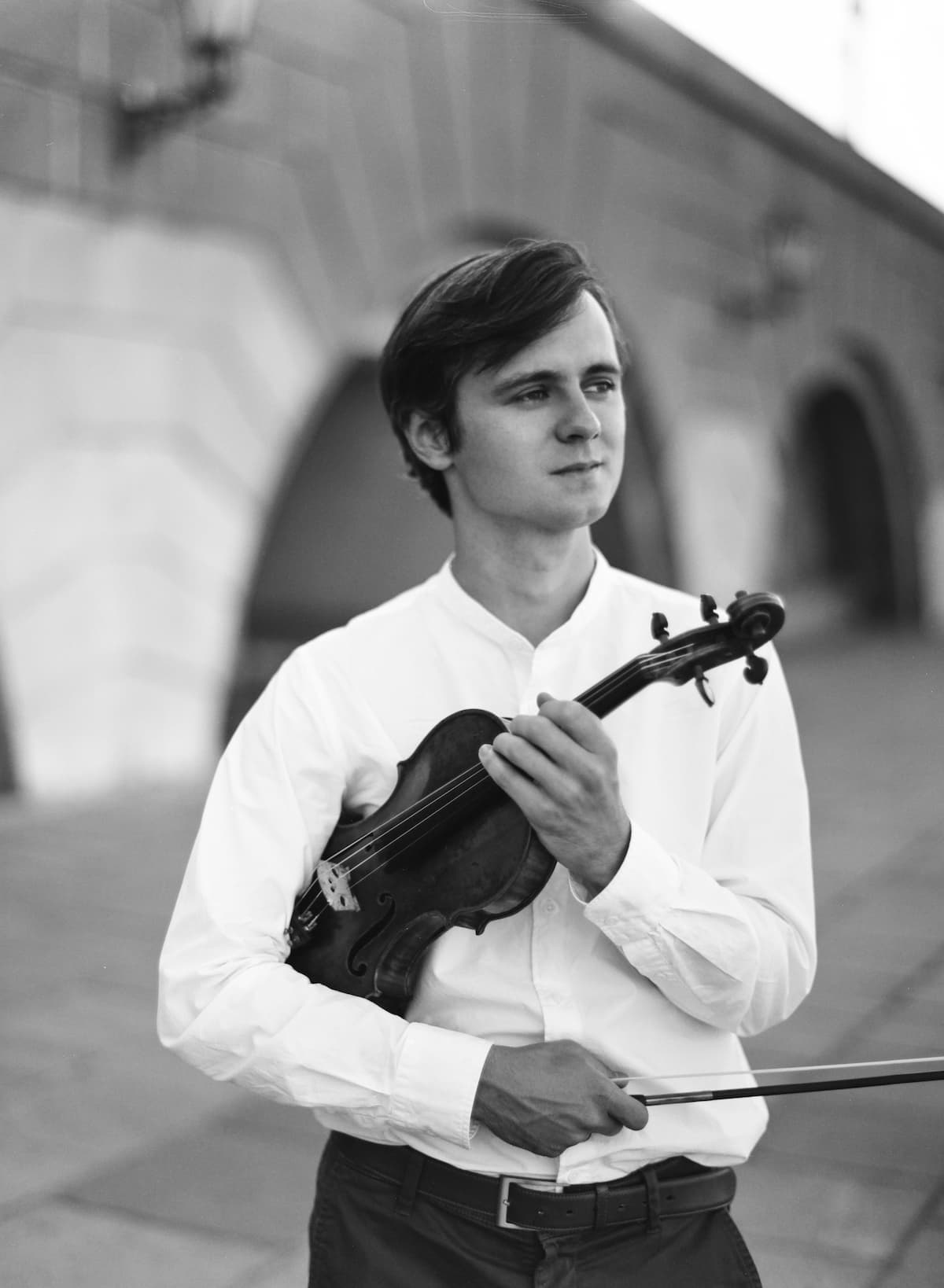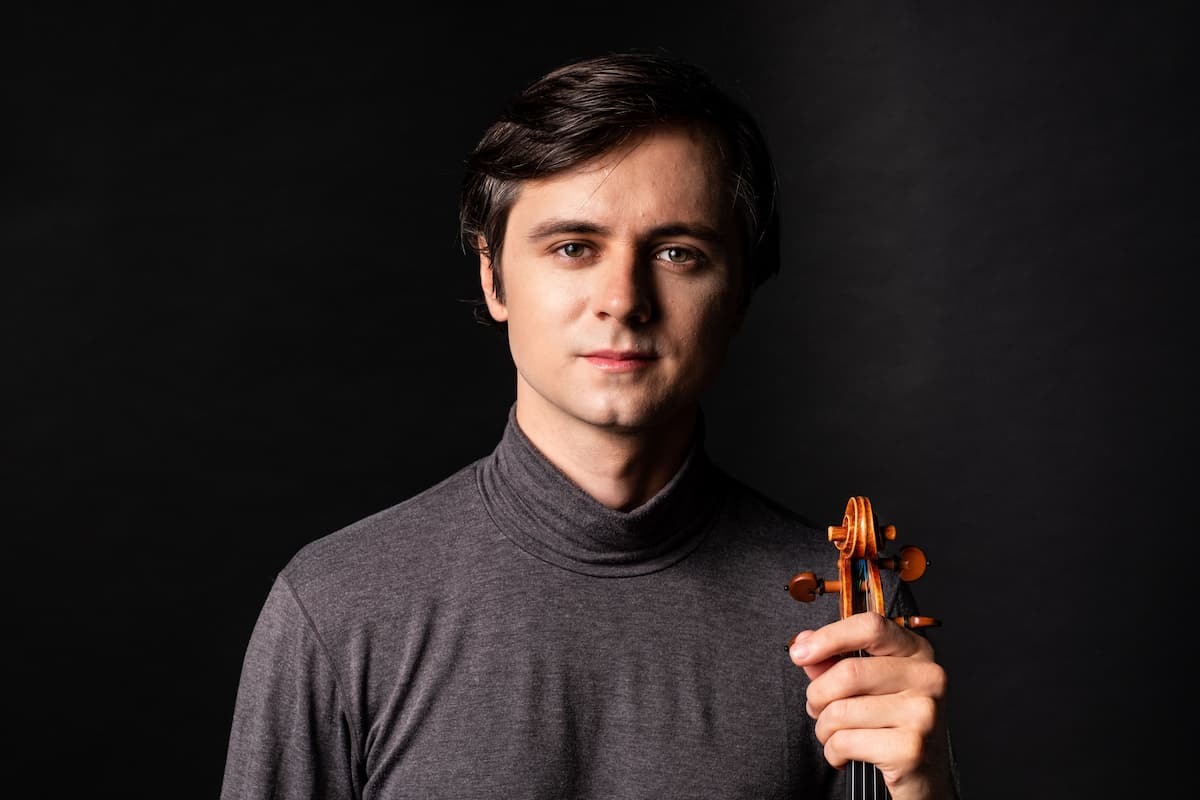‘You have to experiment, like with cooking’

Aleksey Semenenko © Elza Zherebchuk
A musician of fearless technical virtuosity and passionate lyricism, Ukrainian violinist Aleksey Semenenko is sought out internationally as a soloist and collaborator known for his thoughtful yet thrilling performances.
Aleksey won places on both the BBC New Generation and New York Young Concert Artist schemes, leading to engagements across Europe and the US, including recitals at Snape Maltings, Wigmore Hall, the Kennedy Center, and Alice Tully Hall, and concerto performances with orchestras including the BBC National Orchestra of Wales, BBC Philharmonic, Deutsches Symphonie-Orchester Berlin, Seattle Symphony, Orchestra of St Luke’s, National Orchestra of Belgium, Ulster Orchestra, Kyiv Symphony, Hamburger Symphoniker and the Royal Concertgebouw Orchestra.
Starting the violin aged 6 at the behest of his father, himself the bass clarinettist of the Odessa Philharmonic, Aleksey’s journey through learning the violin was not always an easy one. Nowadays, alongside his regular performance schedule, Aleksey is Professor of Violin at the Folkwang University of the Arts, close to Cologne where he is based with his wife and young son. We discuss his early days of learning and how they influenced his present-day pedagogy.
Tchaikovsky | Valse Sentimentale | 2015 Queen Elisabeth Violin Competition
How did you find your way to the violin?
I was brought into music by my father, so it was not my choice. The story wasn’t that I heard the violin and that it was my dream – not at all. One day, when I was about 6, he just took me to the music school (where he was working) and there was a violin teacher there, and all of a sudden there I was, standing in front of them.
The violin was introduced to me by showing me how many strings it had. I remember my very first lesson, and I remember that after the question, ‘How many strings does the violin have?’ I answered ‘Three’, because the fourth string, the E string, was so thin that I thought it was maybe some device that didn’t belong there.
The following lesson was just pizzicato and I don’t remember that I was crazy about playing the violin – it was just something that was there. My own child now is three and a half months old – I understand that what you give him, where you lead him, he will be there. It’s a conditioning thing, and this is how it was with me and the violin.
There was pressure and persistence to practice, and I had some experiences as a child where I was forced to practice: this Eastern behaviour, which I’m not proud of. I will try not to do that with my son!
You started learning the violin because of your father. Did you eventually find a way to make it your own?

©
Maryna Chorna
My father had a stroke and then one and a half years later he died, and right before [he died] I got interested in the Romantic virtuoso repertoire: to master the difficulties, the technical difficulties of the violin.
There was no thrilling feeling of sound on the violin, not at all. It was just about the technical and motor thing to have the pleasure of overcoming it and getting it done. That was when I really started to do it on my own for the first time.
My father died when I was almost 16, and since he died … it was just me and my teacher, and it was then I started to get fanatic, going to school at 6 in the morning [to practise] and coming back home sometime around 11pm.
Do you feel like now it is fully your own thing?
My practice bore fruits, but there are remnants and echoes of my earlier experiences, all these beliefs and conditionings and socialising stuff and habits. All this can come back and reflect like a footprint later on if you’re not careful.
I hit the wall at some point, about four or five years ago, right during the BBC New Generation Artist scheme. I reached the point where it felt like the bubble couldn’t get any bigger. There was a good lesson to start over with my thinking, getting into meditation, exploring my emotions more, and so on.
At some point, you cannot avoid the struggle, the suffering of learning an instrument. You have to go through it, otherwise, pushing it into the corner, into the closet: sooner or later, it will explode.
You are now a Professor at Volkwang University. Do you try and help your students with that side of things, now that you are in the position of being a teacher?

© Elza Zherebchuk
It’s a beautiful opportunity for me, getting this position in order to experiment, in order to make my own choices, looking and reflecting and doing it consciously. I can see my conditioning, I can see, ‘Oh this is this, this is that, this is coming from that corner’.
I had three teachers in my life: one in Odessa, one in Cologne, and Harald Schoneweg as a chamber music professor, so I have three columns, and I can see which column my influences come from.
And there is the fourth column: my own, where I put my accent on what is important to me. I cook my own soup and see what else I can do, that which was not taught or conditioned. With different students, you have to experiment, like with cooking. Some students you can push a bit more, because they are outgoing and ambitious, and others not so much, because they are shy. Here I can meditate with someone if it’s helpful; there you can see it’s not going to work at all.
So the good thing about it is that I can experiment and see what else is there and learn from different pedagogic styles, because what I try to avoid is being closed in this bubble of beliefs where things are going to be fixed a certain way.
Of course I have my thoughts about how the interpretation of a piece should go, inevitably, because you work on a piece and you develop your own beliefs. And yet, I like for the students to have critical thinking, and always think ‘why’. If they play something a certain way, I want them to make an argument about why they are doing it that way. Can they explain it? Is it convincing? So it becomes a discussion.
Aleksey Semenenko, violin | Ysaÿe: Sonata for solo violin “Ballade”
Your approach sounds much more flexible than the one-size-fits-all you sometimes encounter.
Because that approach is stinky boring. After a couple of years, you will be saying the same things, and from the inside, you are just going to rot.
What do you do in your spare time?
For the moment of course my son is taking a lot of time when I’m not working. I love going to the zoo. I like nature. I love all the nature documentaries. Ever since I was a kid I’ve loved things about nature, the cosmos, all these scientific developments and knowledge and discoveries. I have a yearly pass to the zoo in Cologne but in every corner of the earth if I have spare time, I will go to the zoo, if there is a zoo there.
I was playing in Jersey recently with my wife, and there was even a zoo there! I love playing football, I love playing ping pong, but now I don’t have much time for that. In my spare time I love drinking cappuccino in a café with a piece of something sweet. This is sometimes the highlight of the day, sitting in a very good coffee house, meeting other friends there.
I love walking, also: walking through Cologne, discovering the flowers, going into the green.
Your wife is a pianist?
Yes; we built a pretty lovely duo (Alexander Rosenblatt: Carmen Fantasy | Aleksey Semenenko & Inna Firsova) over the years. We grew into it together. It’s not the best way to practise, with such a close person, but on stage, it’s one of the best things.
For more of the best in classical music, sign up for our E-Newsletter




